Contents
- 1 Introduction
- 2 What is the Difference between Self-Confidence and Self-Esteem?
- 3 12 Benefits of High Self-Confidence and Self-Esteem
- 4 7 Major Causes of Self-Confidence and Self-Esteem
- 5 9 Practical Ways to Build Self-Confidence and Self-Esteem
- 6 Resources for Continued Growth in Self-Confidence and Self-Esteem
- 7 Frequently Asked Questions FAQs
Introduction
Self confidence and self esteem are often used interchangeably, but they are distinct concepts with unique roles in our personal development.
Self-confidence is the belief in one’s abilities to succeed in specific situations or accomplish tasks. It’s the voice in your head that says, “I can do this.”
On the other hand, self-esteem is the overall sense of worth and value you place on yourself as a person. It’s about how you view yourself holistically and whether you feel you deserve happiness and success.

Both are essential for a healthy and fulfilling life. High self-confidence allows you to tackle challenges, embrace opportunities, and achieve your goals with determination. Meanwhile, strong self-esteem helps you maintain a positive outlook, build healthy relationships, and navigate life’s ups and downs with resilience.
In this comprehensive guide, we’ll explore self-confidence and self-esteem, highlight their importance in personal development, and clear up the misconceptions that often surround these vital traits.
What is the Difference between Self-Confidence and Self-Esteem?
Self-confidence is the belief in one’s abilities, qualities, and judgment. It is the assurance that you can accomplish tasks and face challenges effectively. This sense of confidence is not innate. It is built over time through experiences, achievements, and the acknowledgment of one’s capabilities.
Self-esteem is the overall sense of value and self-worth that an individual holds. It encompasses how much you appreciate and like yourself, irrespective of circumstances.
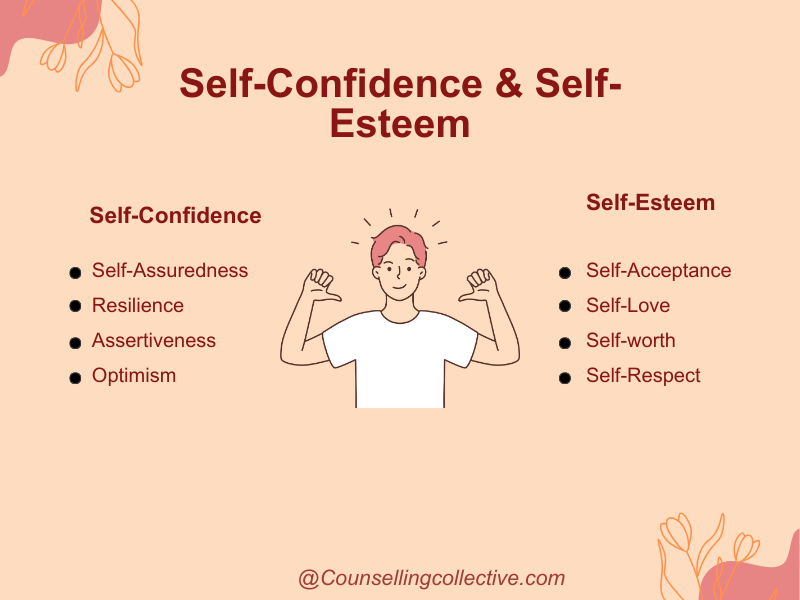
Key Characteristics of Self-Confidence and Self-Esteem
Key characteristics of self-confidence include:
| Key Characteristics | |
| Self-Assuredness | Confident individuals trust their decisions and stand by them, even in the face of uncertainty. |
| Resilience | They are able to bounce back from setbacks and view failures as opportunities for growth. |
| Assertiveness | Self-confident people express their thoughts and needs clearly and respectfully, without being aggressive. |
| Optimism | They maintain a positive outlook and believe in the possibility of achieving their goals. |
Self-confidence manifests in behavior in several ways. Confident individuals often take initiative, volunteer for new projects, and are not afraid to step out of their comfort zones. They maintain good posture, make eye contact, and speak with a clear and steady voice.
Unlike self-confidence, which is often task-specific, self-esteem is a more general and stable trait. It consists of 4 key Characteristics:
| Key Characteristics | |
| Self-Respect | Recognizing and honoring one’s intrinsic worth. |
| Self-Acceptance | Embracing oneself with all strengths and weaknesses. |
| Self-Love | Nurturing and caring for oneself, both physically and emotionally. |
| Self-Worth | Feeling deserving of happiness, success, and respect. |
Example of Self-Confidence and Self-Esteem
- Consider Jane, who confidently presents a new project idea at work. She speaks clearly, answers questions, and maintains eye contact. Her confidence gains her colleagues’ support and inspires her team, increasing the likelihood of her project’s success. In the above example, Jane’s body language, verbosity, and precision are the manifestations of her confidence in herself and in her ability to perform well at work.
- John, with high self-esteem, accepts his strengths and weaknesses. When criticized at work, he views it as constructive feedback. This holistic self-view helps him improve professionally and maintain healthy relationships, contributing to his overall happiness and resilience.
Self-Confidence and Self-Esteem – Key Differences
| Self-Confidence | Self-Esteem |
| Focus: Task-specific abilities and outcomes | Overall sense of self-worth and value |
| Foundation: Built through experience and achievements | General self-worth, regardless of abilities |
| Key Characteristics: Self-assuredness, resilience, assertiveness, optimism | Rooted in self-respect and self-acceptance |
| Manifestation: Taking initiative, stepping out of comfort zones, and clear communication | Self-respect, self-acceptance, self-love, self-worth |
| Importance: Encourages risk-taking, learning, and pursuit of passions | Healthy boundaries, acceptance of strengths and weaknesses, positive self-view |
| Impact on Behavior: Increases likelihood of success in tasks and challenges | Influences interactions, relationships, and mental well-being |
| Response to Criticism: Views it as a learning opportunity to improve skills | Contributes to overall happiness and resilience |
| Dependency: Often influenced by external achievements and feedback | Maintains self-worth, seeing criticism as feedback rather than a personal attack |
| Dependency : Often influenced by external achievements and feedback | More stable and intrinsic, less dependent on external validation |
| Interrelation: Can boost self-esteem through accomplishments | High self-esteem can enhance self-confidence by fostering a positive self-image |
In the world of self-confidence and self-esteem, it’s crucial to understand both the shining benefits and the potential drawbacks of lacking these vital qualities.
In the upcoming sections, we’ll explore how cultivating high self-confidence and self-esteem can transform your life for the better, and what happens when these traits are missing. This journey is not just about highlighting the positives but also about recognizing the areas where we might be falling short.
12 Benefits of High Self-Confidence and Self-Esteem
Building high self-confidence and self-esteem has been transformative in my life and in the lives of many others. From my personal experiences and research, I’ve discovered numerous benefits that significantly impact various aspects of life.
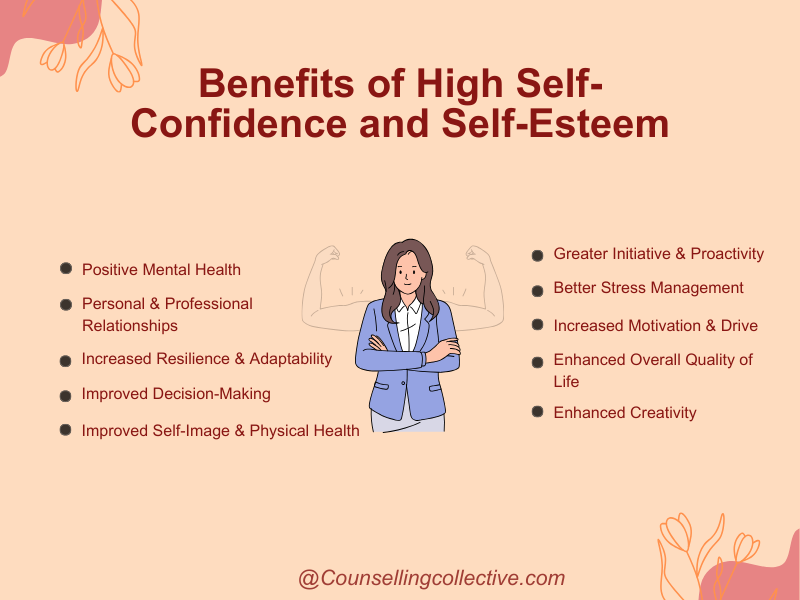
Here, I’ll break down these benefits into 12 key areas.
| 1 | Positive Impact on Mental Health One of the most significant benefits of having high self-confidence and self-esteem is the positive impact on mental health. When I started believing in myself, I noticed a substantial decrease in anxiety and stress. Research supports this, showing that individuals with higher self-esteem experience fewer symptoms of depression and anxiety. This improvement in mental health allows for a clearer, more focused mind, enabling one to handle life’s challenges more effectively |
| 2. | Enhanced Personal Relationships High self-confidence allows us to form deeper and more meaningful relationships. When you believe in yourself, it becomes easier to open up to others, communicate honestly, and build trust. For example, in friendships, being confident means you can express your thoughts and feelings more openly, which strengthens your bonds. Studies also show that people with high self-esteem tend to have healthier and more stable relationships. |
| 3. | Enhanced Professional Relationships In the professional realm, self-confidence can be a game-changer. If you begin to assert your ideas and take initiative at work, you will notice a significant improvement in how your colleagues and superiors perceive you. Confident people are often seen as more capable and reliable, leading to better opportunities for career advancement. This isn’t just anecdotal; research highlights that employees with higher self-esteem are more likely to be successful and satisfied in their careers. |
| 4. | Increased Resilience and Adaptability Resilience and adaptability are crucial in today’s fast-paced world. High self-confidence has helped me bounce back from setbacks more quickly. Instead of dwelling on failures, I learned to view them as opportunities for growth. This mindset shift is supported by research, which shows that individuals with high self-esteem are better equipped to handle stress and recover from adversity. |
| 5. | Improved Decision-Making Self-confidence plays a vital role in decision-making. When you trust your judgment, you can make decisions more swiftly and with greater conviction. This confidence in your choices can lead to better outcomes in both personal and professional life. |
| 6. | Greater Initiative and Proactivity Taking the initiative can lead to significant personal and professional growth. With higher self-confidence, I found myself stepping out of my comfort zone more often, seeking new challenges, and being proactive in pursuing my goals. This proactive approach is crucial for success. |
| 7. | Enhanced Overall Quality of Life High self-confidence and self-esteem contribute to an overall better quality of life. When you feel good about yourself, it positively influences your outlook on life, making you happier and more content. For me, this shift in perspective has been life-changing, making everyday experiences more enjoyable and fulfilling. Research supports this, showing a strong link between self-esteem and overall life satisfaction. |
| 8. | Improved Physical Health High self-confidence and self-esteem can positively impact physical health. When you believe in yourself, you’re more likely to take care of your body through regular exercise, a balanced diet, and adequate rest. Personally, I found that as my self-esteem improved, so did my commitment to maintaining a healthy lifestyle. It is supported by research, which indicates that people with higher self-esteem are more likely to engage in health-promoting behaviors. |
| 9. | Increased Motivation and Drive Self-confidence fuels motivation and drive. When you have a strong belief in your abilities, you’re more likely to set ambitious goals and work diligently towards achieving them. For instance, I noticed a surge in my motivation to pursue new skills and challenges once my self-esteem grew. |
| 10. | Enhanced Creativity Confidence in one’s abilities often leads to greater creativity. When you’re not second-guessing yourself, you’re more willing to think outside the box and explore innovative solutions. In my experience, higher self-esteem has led to more creative problem-solving and a willingness to experiment with new ideas. Research also suggests that self-confident individuals are more likely to engage in creative thinking and innovation. |
| 11. | Better Stress Management High self-confidence and self-esteem equip you with better tools for managing stress. Believing in your ability to handle challenges reduces the overall impact of stress on your life. Studies indicate that individuals with higher self-esteem experience lower stress levels and better stress management skills. |
| 12. | Improved Self-Image A positive self-image is a direct benefit of high self-confidence and self-esteem. When you value yourself, you’re more likely to have a healthy and positive perception of your body and abilities. Studies show that individuals with higher self-esteem are more likely to have a positive body image and self-perception. |
7 Major Causes of Self-Confidence and Self-Esteem
Understanding the root causes of low self-confidence and self-esteem is essential for addressing and overcoming these issues.
From my own experiences and extensive research, I’ve identified several common factors that can contribute to a diminished sense of self-worth and confidence.
Let’s dive into these causes and explore how they impact us.
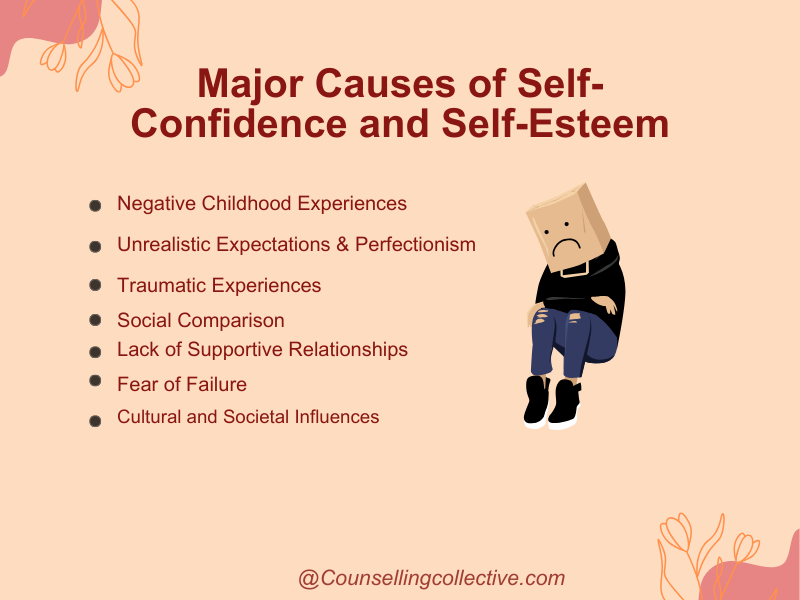
Negative Childhood Experiences
Negative experiences during childhood play a significant role in shaping our self-confidence and self-esteem. If you grew up in an environment where criticism was frequent and praise was scarce, it’s likely that you developed a negative self-image.
For instance, children who are constantly told they are not good enough may internalize these messages, leading to long-term self-doubt.
Bullying is another critical factor. Children who are bullied by their peers often carry the scars of these experiences into adulthood, resulting in a pervasive sense of inadequacy and low self-worth.
Unrealistic Expectations and Perfectionism
Many of us set unrealistic expectations for ourselves, striving for perfection in every aspect of our lives. When we inevitably fall short of these impossible standards, it can severely impact our self-confidence and self-esteem. I’ve struggled with this myself, feeling like a failure for not meeting my own high expectations.
Perfectionism creates a cycle of self-criticism and dissatisfaction, where even minor mistakes are seen as major failures. This mindset prevents us from recognizing our achievements and appreciating our strengths, further eroding our self-esteem.
Traumatic Experiences
Traumatic experiences, whether in childhood or adulthood, can have a profound impact on our self-confidence and self-esteem. Events such as physical or emotional abuse, severe illness, or the loss of a loved one can leave us feeling vulnerable and helpless.
The trauma can lead to feelings of shame, guilt, and unworthiness, making it difficult to view ourselves positively. Professional help, such as therapy, is often needed to work through these deep-seated issues and begin the healing process.
Social Comparison
In today’s digital age, social comparison has become a significant factor in the decline of self-confidence and self-esteem. Constant exposure to curated images and success stories on social media can make us feel inadequate in comparison. I’ve found myself falling into the trap of comparing my behind-the-scenes to someone else’s highlight reel, leading to feelings of envy and self-doubt.
Research shows that excessive social media use is linked to lower self-esteem and higher levels of anxiety and depression. It’s crucial to remember that what we see online is often a polished version of reality, not an accurate representation of others’ lives.
Lack of Supportive Relationships
The relationships we have significantly influence our self-esteem and confidence. Supportive friends and family members can provide the encouragement and affirmation needed to build a positive self-image. Conversely, relationships characterized by criticism, neglect, or abuse can be incredibly damaging.
I’ve seen firsthand how being surrounded by negative or unsupportive individuals can drain your confidence and make you doubt your worth. Building a network of positive, encouraging relationships is essential for fostering self-esteem.
Fear of Failure
Fear of failure is a common cause of low self-confidence. When we are overly afraid of making mistakes, we become hesitant to take risks or try new things. This fear often stems from past failures or harsh criticism. I’ve experienced this fear, avoiding opportunities because I was terrified of failing and confirming my worst fears about myself.
Embracing a growth mindset, where failures are seen as opportunities for learning and growth, can help overcome this fear and build self-confidence.
Cultural and Societal Influences
Cultural and societal influences also play a role in shaping our self-confidence and self-esteem. Societal standards regarding beauty, success, and behavior can create unrealistic expectations that are impossible to meet. These pressures can lead to feelings of inadequacy and low self-worth. For instance, the pervasive media portrayal of ideal body types has made many people feel insecure about their appearance.
Understanding and challenging these societal norms is crucial for developing a healthier self-image.
9 Practical Ways to Build Self-Confidence and Self-Esteem
Building self-confidence and self-esteem is a journey, and I’ve found that practical daily habits can make a world of difference.
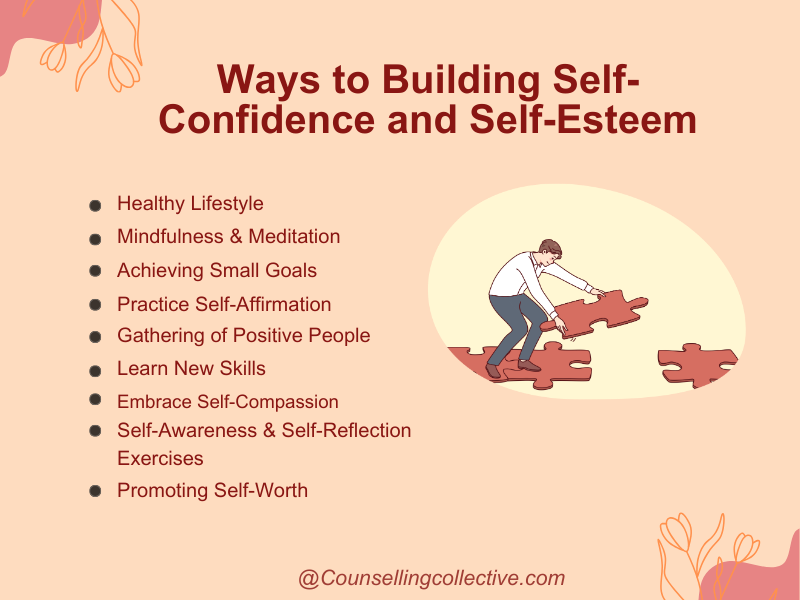
Here are some tried-and-true methods that have worked for me and are backed by research.
| 9 Ways To Boost Self-Confidence and Self-Esteem | |
| 1. | Maintain a Healthy Lifestyle One of the most effective ways to boost your self-confidence and self-esteem is to maintain a healthy lifestyle. Regular exercise, a balanced diet, and adequate sleep have a profound impact on how we feel about ourselves. For instance, when I started jogging every morning, not only did I feel more energetic, but my mood improved dramatically. Exercise releases endorphins, which are known as “feel-good” hormones. Eating nutritious foods fuels your body and mind, while good sleep restores and refreshes you. Research consistently shows that a healthy lifestyle contributes to better mental health and a positive self-image. |
| 2. | Practice Mindfulness and Meditation Mindfulness and meditation are powerful tools for building self-confidence and self-esteem. I started meditating for just ten minutes each morning, focusing on my breath and letting go of negative thoughts. This practice helped me become more aware of my thoughts and emotions without judging them. Mindfulness reduces stress and anxiety, which are often barriers to self-confidence. Numerous studies have shown that mindfulness improves emotional regulation and enhances self-awareness, leading to higher self-esteem. |
| 3. | Set and Achieve Small Goals Setting and achieving small goals is a great way to build confidence. Breaking down larger goals into smaller, manageable tasks makes them less daunting and more achievable. This approach not only builds your confidence but also keeps you motivated and focused. I remember when I first decided to improve my public speaking skills. Instead of aiming to speak at a large conference right away, I started by setting a goal to speak up in small meetings. Each time I achieved one of these small goals, my confidence grew. |
| 4. | Practice Self-Affirmation Self-affirmation involves repeating positive statements about oneself to reinforce a positive self-view and boost self-confidence. One technique that has worked well for me is creating a list of positive affirmations. Every morning, I read these affirmations aloud: “I am confident and capable,” “I deserve success and happiness,” and “I am proud of who I am.” Repeating these statements daily has gradually shifted my mindset to be more positive and self-affirming. |
| 5. | Surround Yourself with Positive People The company you keep significantly affects your self-esteem. I’ve noticed that spending time with supportive and positive individuals lifts my spirits and encourages me to believe in myself. Positive relationships provide emotional support and a sense of belonging, which are crucial for self-esteem. Seek out friends, mentors, and colleagues who inspire and motivate you. Their positivity will rub off on you, making you feel more confident and valued. |
| 6. | Learn New Skills Learning new skills is another effective way to boost your self-confidence and self-esteem. When I decided to learn coding, the sense of accomplishment I felt upon mastering a new skill was incredible. It opened up new opportunities and gave me confidence in my ability to tackle challenges. Whether it’s learning a new language, picking up a hobby, or advancing your professional skills, continuous learning keeps your mind active and reinforces your self-worth. Studies show that lifelong learning is associated with greater overall well-being and self-esteem. |
| 7. | Embrace Self-Compassion Self-compassion means treating yourself with kindness and understanding, especially when you fail or make mistakes. I used to be very hard on myself, but I’ve learned to be gentler and more forgiving. Now, when things don’t go as planned, I remind myself that everyone makes mistakes and it’s okay to fail. Practicing self-compassion has helped me build a more positive self-image and resilience. |
| 8. | Self-Awareness and Self-Reflection Exercises Self-awareness is the foundation of building self-esteem. Understanding your strengths, weaknesses, values, and beliefs helps you see yourself more clearly and appreciate your unique qualities. One exercise that has been particularly helpful for me is keeping a journal. This practice has helped me become more aware of my achievements and areas for improvement. Another effective exercise is the “SWOT Analysis” (Strengths, Weaknesses, Opportunities, Threats). Research shows that self-reflection enhances self-awareness and leads to greater self-acceptance, which is key to building self-esteem. |
| 9. | Engaging in Activities that Promote Self-Worth Participating in activities that align with your values and interests can significantly boost your self-esteem. I’ve found that engaging in hobbies and pursuits that I am passionate about makes me feel more fulfilled and confident. For example, I love painting, and dedicating time to this creative outlet allows me to express myself and see my progress, which reinforces my sense of self-worth. Volunteering is another activity that has positively impacted my self-esteem. Giving back to the community and helping others provides a sense of purpose and accomplishment. It reminds me that I have valuable contributions to make, which enhances my self-esteem. |
Resources for Continued Growth in Self-Confidence and Self-Esteem
Building self-confidence and self-esteem is an ongoing journey, and having the right resources can make a significant difference.
Here, I’ve compiled a list of books, podcasts, online courses, apps, and tips for finding professional help to support your growth.
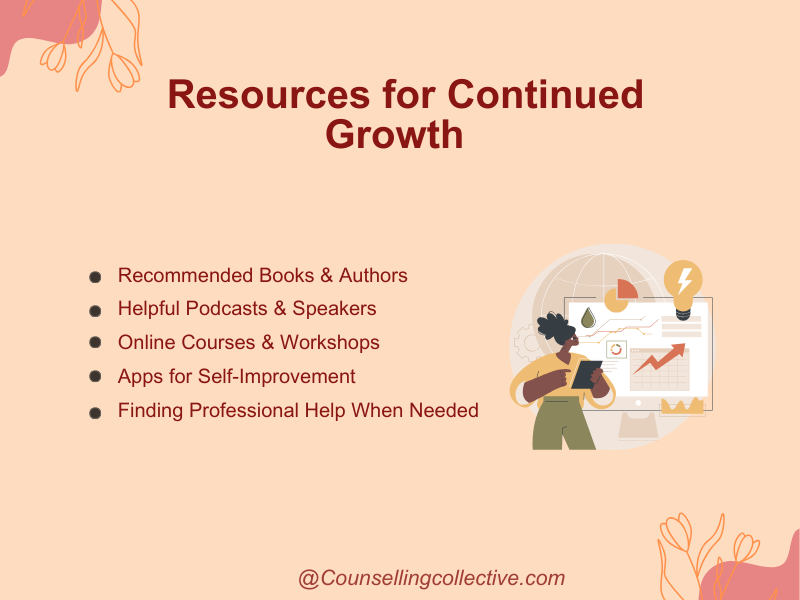
| 1. Recommended Books and Authors Books can be incredibly powerful tools for personal development. Here are some highly recommended reads: “Mindset: The New Psychology of Success” by Carol S. Dweck: Carol Dweck explores the concept of a growth mindset, which is crucial for developing self-confidence and resilience. “The Gifts of Imperfection” by Brené Brown – Another gem by Brown, this book helps readers understand and embrace their imperfections, fostering greater self-esteem. | 2. Helpful Podcasts and Speakers Podcasts are a convenient way to gain insights and motivation on the go. Here are some that focus on self-confidence and self-esteem: “Unlocking Us” by Brené Brown – Brené Brown’s podcast features candid conversations with thought leaders on topics related to vulnerability, courage, and personal growth. “The Tony Robbins Podcast” – Tony Robbins shares strategies and interviews with experts to help listeners overcome their fears and achieve personal breakthroughs. |
| 3. Online Courses and Workshops Online courses and workshops provide structured learning and can be highly effective for personal development: Udemy – Features various courses on confidence building, such as “Confidence and Self Esteem Mastery” by Jimmy Naraine. Mindvalley – Provides transformative programs like “The Quest for Personal Mastery” by Srikumar Rao, focusing on self-awareness and personal growth. | 4. Apps for Self-Improvement There are several apps designed to help you improve self-confidence and self-esteem through daily practice: Headspace – This meditation app offers guided sessions that promote mindfulness and self-compassion, which are key to building self-esteem. Calm – Another great meditation app that includes specific programs for reducing anxiety and boosting confidence. |
Finding Professional Help When Needed
Sometimes, professional guidance is necessary to overcome deep-seated issues related to self-confidence and self-esteem:
- Therapists and Counselors – Licensed professionals can provide personalized strategies and support. You can Meet Your Therapist through our repository as well.
- Life Coaches – A life coach can help you set goals, build confidence, and create actionable plans for personal growth. Look for certified coaches through the International Coach Federation (ICF).
- Support Groups – Joining a support group can offer a sense of community and shared experience. Organizations like the National Alliance on Mental Illness (NAMI) provide resources and support groups for various mental health issues.
Frequently Asked Questions FAQs
What Does Lack Of Confidence Look Like?
Lack of confidence can manifest in various ways, often influencing our behavior and outlook on life. For example, it might look like someone avoiding new challenges or opportunities because they fear failure or rejection.
People with low confidence might also struggle with social interactions. They may avoid speaking up in meetings or social gatherings, worried that their contributions aren’t valuable. This can create a cycle where their lack of participation leads to fewer opportunities for positive reinforcement, further diminishing their confidence.
Why Do We Lose Self Confidence As We Get Older?
Losing self-confidence as we get older is more common than you might think, and it can stem from various factors. One reason is the accumulation of life experiences, particularly negative ones. Each setback, failure, or criticism can chip away at our self-confidence.
For instance, after experiencing several job rejections, I found myself questioning my professional worth more than I did in my younger years.
Another factor is the comparison trap. With age, we often compare our achievements to those of our peers or societal expectations, which can lead to feelings of inadequacy. Additionally, physical changes and health issues that come with aging can affect how we perceive ourselves, impacting our self-confidence.
How Does Self Confidence Affect Self Esteem?
Self-confidence and self-esteem are closely intertwined, each influencing the other. When you have high self-confidence, you’re more likely to take on challenges and succeed, which can boost your self-esteem.
For example, when you start to build confidence in public speaking skills, your overall self-esteem will improve. You will feel more competent and valued, not just in speaking engagements but in other areas of your life too.
Conversely, low self-confidence can lead to repeated failures or avoidance of challenges, which can erode self-esteem over time.
What Is The Best Therapy For Low Self-Esteem?
The best therapy for low self-esteem depends on individual needs, but several effective approaches include:
- Cognitive-Behavioral Therapy (CBT) – Helps reframe negative thought patterns and develop healthier self-perceptions.
- Humanistic Therapy – Focuses on self-acceptance and personal growth, emphasizing empathy and unconditional positive regard.
- Psychodynamic Therapy – Explores underlying unconscious conflicts and past experiences that contribute to low self-esteem.
Each approach offers unique benefits, and a licensed therapist can help determine the best fit for you.
How Long Does It Take To Regain Self Confidence?
The journey to regaining self-confidence varies for each individual and depends on various factors, such as the severity of the confidence loss and the strategies employed to rebuild it.
For me, it took six months of consistent effort, including therapy, self-reflection, and gradually taking on new challenges, to start seeing significant improvements.
On average, many people start noticing improvements within 6 months, but it can take longer for deeper, more lasting changes to occur. Remember, building self-confidence is an ongoing process and a lifelong journey.
Bibliography
- Lundberg, T., Årestedt, K., Forinder, U., Olsson, M., Fürst, C. J., & Alvariza, A. (2022). Higher Self-Esteem Associated With Less Symptoms of Anxiety and Depression Among Young Adults After the Loss of a Parent to Cancer—A Longitudinal Study. Journal of Palliative Care, 37(2), 113-119. https://doi.org/10.1177/08258597211044585
- Erol, Ruth & Orth, Ulrich. (2016). Self-Esteem and the Quality of Romantic Relationships. European Psychologist. 21. 274-283. 10.1027/1016-9040/a000259.
- Liu, Q., Jiang, M., Li, S., & Yang, Y. (2020). Social support, resilience, and self-esteem protect against common mental health problems in early adolescence: A nonrecursive analysis from a two-year longitudinal study. Medicine, 100(4). https://doi.org/10.1097/MD.0000000000024334
- Tabrizi, J.S., Doshmangir, L., Khoshmaram, N. et al. Key factors affecting health-promoting behaviors among adolescents: a scoping review. BMC Health Serv Res 24, 58 (2024). https://doi.org/10.1186/s12913-023-10510-x
- Álvarez-Huerta, P., Muela, A., & Larrea, I. (2022). Disposition toward critical thinking and creative confidence beliefs in higher education students: The mediating role of openness to diversity and challenge. Thinking Skills and Creativity, 43, 101003. https://doi.org/10.1016/j.tsc.2022.101003
- Moza, D., Lawrie, S. I., Maricuțoiu, L. P., Gavreliuc, A., & Kim, H. S. (2021). Not All Forms of Independence Are Created Equal: Only Being Independent the “Right Way” Is Associated With Self-Esteem and Life Satisfaction. Frontiers in Psychology, 11, 606354. https://doi.org/10.3389/fpsyg.2020.606354
- Khalaf, A., Hashmi, I. A., & Omari, O. A. (2021). The Relationship between Body Appreciation and Self-Esteem and Associated Factors among Omani University Students: An Online Cross-Sectional Survey. Journal of Obesity, 2021. https://doi.org/10.1155/2021/5523184
- The Confidence Code: The Science and Art of Self-Assurance—What Women Should Know – Amazon
- Daring Greatly: How the Courage to Be Vulnerable Transforms the Way We Live, Love, Parent, and Lead by Brene Brown On Amazon.com
